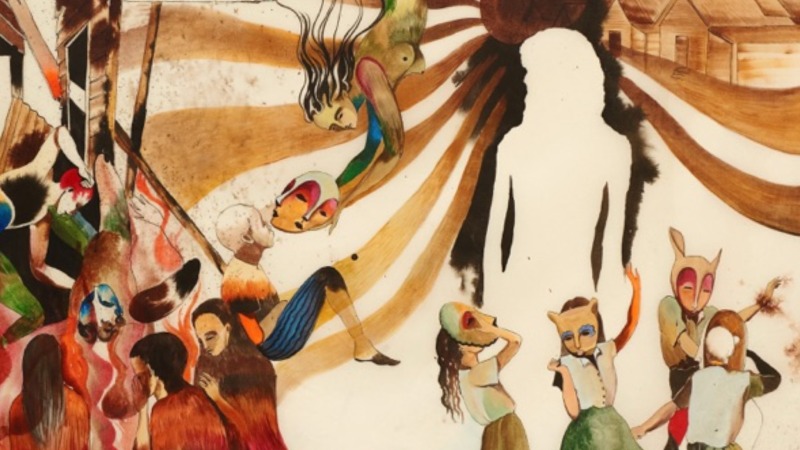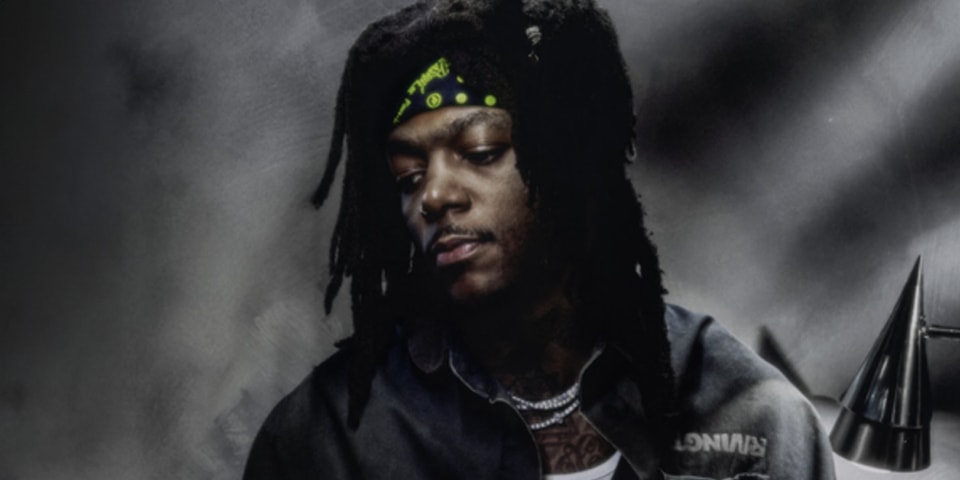Table of Contents
JID’s Artistic Evolution

By the time JID officially joined the Dreamville collective back in 2017, he already possessed two independent underground projects under his belt. He wasn’t just starting out; he was actively sharpening his lyrical blades quietly in the background, rapping with a level of skill that clearly showed he hadn’t merely studied the legendary greats before him – he had thoroughly memorized their intricate footwork and technical mastery. Consequently, ‘God Does Like Ugly’, his latest and most ambitious artistic statement, feels significantly less like a straightforward album and much more like a meticulously annotated academic thesis on hip-hop itself. It presents a dense, energetically frantic sonic sprawl, where booming church organs unexpectedly give way to smooth Los Angeles funk, breakbeats dramatically give way to soaring gospel choir harmonies, and sharp post-Dilla instrumental detours violently jerk the steering wheel sideways at the start of every new verse.
However, crucially positioned underneath this impressive musical spectacle, listeners discover an artist who has fully transformed from a dedicated student into an undeniable master; his syllables tumble out with the unpredictable energy of rolling dice, yet remarkably, not a single one feels wasted or unnecessary. Significantly, it has been a full three years since his acclaimed release *The Forever Story*, and now JID confidently returns with a project demonstrating even greater precision, heightened obsession, and arguably more sheer brilliance than anything he has previously created.
Explosive Album Opening
The album detonates immediately with its opening track, “YouUgly,” unleashing a relentless, stuttering barrage of heavy 808 bass kicks alongside percussion that strikingly resembles live drumsticks fiercely striking actual snares, creating a raw, percussive, and almost feral energy. JID’s own rapid-fire verse, joined by a feature from the distinctive Westside Gunn, skillfully slithers and weaves its way through not one, not two, but three distinct, dizzying beat switches. These transitions propel the track aggressively from an initially grating, deep bass foundation, suddenly shifting upward into resonant gospel organ chords, before finally landing on some electrifying, dangerous third sonic rail pulsating menacingly in between these extremes. Throughout this controlled chaos, there’s a palpable poetic recklessness driving his vocal flow – it feels tightly managed, yet only just barely contained.
Following this explosive start, “Glory” picks up the momentum directly like a passionate sermon already midway through a profound revelation. The track feels deeply motivational, infused with warm gospel-tinged soulfulness, featuring a beautifully transposed soul sample looping hypnotically beneath JID’s syllables. These words fly across the beat at such blistering speed that they consistently threaten to outpace the listener’s immediate comprehension. The effect is intense: if you merely blink for a second, you’ve almost certainly missed something genuinely profound within the lyrical torrent.
Work Chant Intensity
On the track “WRK,” a powerful work song transformed into a fierce war cry, the central word “work” gets repeatedly chanted by backing vocals like an intense, hypnotic spell. This chanting effectively clears vital sonic space, consequently allowing JID himself to step forward and swing his lyrical hammer with incredible, almost surgical precision and devastating impact. Immediately following, “Community,” featuring the legendary duo Clipse, skillfully folds classic boom bap rhythms into something far stranger and more urgently contemporary. The result feels like a raw street sermon deeply steeped in potent cultural relics and crackling, almost prophetic static, creating a dense atmosphere.
Meanwhile, “Gz” rolls in powerfully right afterwards, returning the album to its bass-heavy foundation. This time, a recognizable saxophone loop was heavily altered and aggressively filtered, with an extreme effect of almost madness being deliberately used. As a result, the total sound reflects the unsettling feeling of lively jazz being harshly lowered through a rusty sewer grate and coming out distorted and threatening.
Lighter Musical Moments
Thankfully, the album also offers moments of levity and reflection. For instance, “VCR” opens with a deliberately crooked, snapshot-like portrayal of the often-discussed yet elusive American Dream. This thematic exploration is perfectly scored by Jay Versace’s characteristically dusty, collage-like production style. Fundamentally, the song tackles the complex reality of finally getting paid and the profound, often damaging effects sudden wealth can inflict upon the human soul; featured guest Vince Staples delivers a verse deeply immersed in his unique artistic perspective on these themes. Subsequently, “Sk8,” created alongside Ciara and Earthgang, radiates pure, unadulterated kinetic joy. Infectious highlife rhythms provide the energetic backbone, cleverly undercut by JID’s signature slippery, melodic flow switch. This effortless vocal agility strongly reminds the listener that JID isn’t merely rapping technically; he’s actively dancing rhythmically with his words across the vibrant beat.
Dreamy & Emotional Climax
Later, “What We On” arrives with a distinctly dreamlike, hazy quality. Mysterious, reversed bass tones pulse underneath before being dramatically swallowed whole by Don Toliver’s bold, heavily autotuned vocals. These processed vocals unexpectedly bloom into a surprisingly catchy melody, acting as a subtle flex before the listener even fully realizes the artistry involved. Then comes the penultimate track, “Wholeheartedly,” presenting an immense, orchestral ache built upon sweeping strings and soaring choir harmonies. Featured appearances from Ty Dolla $ign and 6lack feel seamlessly smuggled in among the densely layered voices. Simultaneously, this intricate layering masterfully creates the overwhelming feeling of an entire room packed with different men, all unexpectedly experiencing the exact same profound, shared emotion in unison.
Luxurious Vocal Moment
“No Boo” complexly is the most lavish and detailed in terms of sound album’s moment, perfectly melding the solo and the female vocalizations into an intricate fabric. Co-featuring artist Jessie Reyez greatly contributes to the depth of the track together with JID, while a delicate and eerie piano line pervades the whole song, evoking potent associations with the fading memory of a lover you agonizingly try to grasp. This creates an atmosphere thick with longing and bittersweet reflection.
“And We Vibing” on the other hand, is just a short and brief musical break that reflects a great deal of feeling to the audience with its intricate vocal layers and its purposely vague, roundabout way of expression that allows the reader to make their own interpretations. Following this one straight away, the listener is “On McAfee” assaulted with the raw, spontaneous, half-drunk freestyle energy of a 3 AM session. The artist seems to perform with a perfect lack of effort, almost twitching with a relaxed and casual yet very impressive technical skill, each and every one of his syllables with sniper-like precision.
Shifting Moods & Scriptural Depth

Subsequently, “Of Blue” allows a momentary breath of calm. The soft, calming guitars and Mereba’s absolutely angelic vocals lull the listener to a false expectation of quiet and serenity. But, JID, very suddenly breaks this peace with another energetic beat and throws in an impassioned vocal sermon. Directly after that, “K-Word” starts to evoke cinematic tension with its multiple guitar layers and low, powerful bass lines. The song’s vibe is very dynamic; it doesn’t quite put a fence between very subdued, intimate confessions and loud, angry shouts. JID’s words during this process are quite heavy as if they’re scriptural: they can be seen as very close personal diary entries and at the same time as the speaker’s unyielding personal doctrine.
By the time “For Keeps” powerfully arrives, the entire album journey has come full circle. This track serves as a plainspoken, emotionally gut-punch finale that reads like a raw, heartfelt memo addressed directly to JID’s own past self. He vividly recalls being hungry, unseen, and tirelessly uploading verses into the apparent void of SoundCloud while the wider world largely ignored him. The song’s closing intensity carries a clear, triumphant declaration: they won’t overlook him anymore.
Album’s Demanding Vision
As a result, God Does Like Ugly is no longer just a showcase of skill; it is a deep, challenging response from art. JID is no longer making a shy request for attention, rather he is emphatically making his presence known not by loudness but with his unique creative vision and careful execution of work. Every individual track feels meticulously constructed, like a distinct room JID has built entirely from scratch. Each syllable is placed with deliberate intention, like precise brickwork, and every surprising beat switch functions like a cleverly hidden trapdoor, suddenly dropping the listener into deeper, unexplored emotional territory.
The end result is a rich and brilliant collection of pieces, which invites and actually requires repeated and thorough listening. The need for rereading does not come from confusing darkness, but because the record is absolutely alive and vibrant. On the whole, JID is not making a rap call for help. Rather, through his potent presence, he keeps us alive to the fact that rap is still the most real and engaging when it is tripping and bravely changing into new variations. At times, it is unattractive, unattractive as the truth of the fight, unattractive as the growth of the necessary kind, unattractive as something raw and authentic that you simply cannot look away from.



